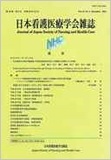Japanese
English
- 有料閲覧
- Abstract 文献概要
- 参考文献 Reference
要旨
【目的】
看護における患者の「自立」がもつ意味の変遷を明らかにした。
【方法】
社会科学の研究手法を踏襲した文献研究である。3種類の文献を収集し「戦後すぐ〜1970年代」と「1980年代〜2000年代」に時期区分した。患者の自立が語られている文脈に注目し、そこに含まれる意味の変遷を分析した。
【結果】
戦後すぐ〜1970年代は、近世の看護理論の影響を受け、患者の「自立」はセルフケアの自立に見出されてきたが、それは一人ひとりに応じた目標であり援助を必要とする。1980年代〜2000年代は看護者の倫理綱領の整備に伴い、「自律」という語が使われるようになった。患者の「自立」は、一人ひとりの患者の状況によって多様な意味を含ませてきた。
【結論】
看護は、患者の「自立」の意味を、従来よりも広い範囲で拡大し進化させてきた。
[Objective]
The objective of the study was to determine changes in meaning of the term “independence,” for patients in nursing over the passing of time.
[Method]
This literature review used research techniques within the social sciences. Three types of documents were collected and classified as “period immediately following WWII through 1979” and “1980 to the present time.” Passages in which the independence of patients was mentioned were picked out and nuances of the term were analyzed.
[Results]
Concerning the period immediately following WWII through 1979, because of the influence of modern nursing theory, the term, “independence,” was found to refer basically to providing assistance so patients could take care of themselves. Along with the development of a code of ethical practice for nurses from the 1980s to the 2000s, the term “autonomy” began to be used. A patient's “independence” came to encompass a variety of different meanings depending on the conditions of that individual patient.
[Conclusion]
Nursing expanded the meaning of “independence,” helping it evolve and giving it a broader scope than in previous usage.
Copyright © 2016, Japan Society of Nursing and Health Care All rights reserved.


